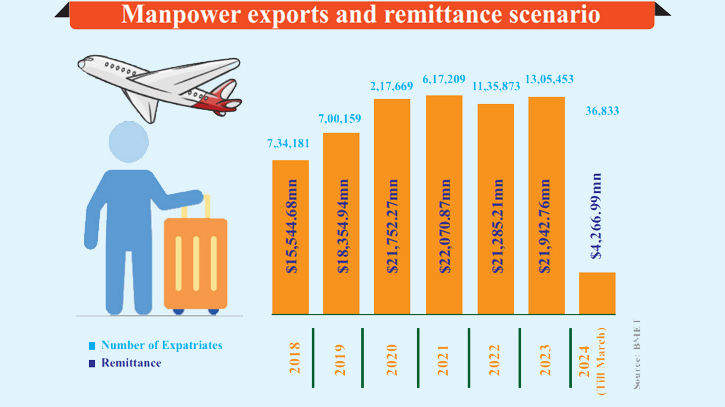
Photo : Messenger
The country has witnessed a sharp rise in manpower exports in recent years. From 2018 to March 2024, nearly 50 lakh men and women went abroad with work permits, marking a significant milestone for the country. During the same period, expatriates sent $125.22 billion in remittances from abroad, contributing substantially to the national economy.
This information has been confirmed by the Bureau of Manpower, Employment and Training (BMET).
BMET Additional Director General Shah Abdul Tariq told The Daily Messenger, “Various government initiatives, visa process facilitation, and reducing internal complexities have contributed to this success.”
He hopes that with the manpower export trend of the last three months, a record number of men and women will be able to go abroad with legitimate work visas this year too.
Responding to a question, Shah Abdul Tariq said they are committed to sending skilled manpower abroad, and skilled people are indeed going. Some unskilled workers are going too, which is true. But they are also in the process of ensuring they can go skillfully.
Experts say people are going abroad with work permits, but remittance inflow is not increasing at that rate as revealed by Bangladesh Bank data. Bangladesh Bank fears that due to instability in the dollar market, rates are higher in the open market. And to get these higher rates, a large portion of expatriates are sending money home illegally through hundi, which is not being recorded in Bangladesh Bank's accounts.
Experts also mentioned that due to the failure to stop money laundering, sending people abroad is not yielding results. Even if more people go abroad in the future, the country may not get additional remittances.
Shariful Hasan, Associate Director of BRAC Migration Program and BRAC Youth Platform, told The Daily Messenger, “Instead of just considering the numbers, it needs to focus more on sending skilled manpower, which will increase the country's remittance flow.”
He added, “Just sending people won't do – it needs to look at whether the workers are getting facilities there, whether they are being paid properly, etc.”
According to the BMET sources, 734,181 people went abroad with work permits in 2018. In 2019 it was 715,159, in 2020 it was 217,669, in 2021 it was 617,209, in 2022 it was 1,135,873, in 2023 it was 1,305,453, and until March 2024 it was 236,833 men and women.
Sources mentioned that in these 6 years, the highest number of 2,545,786 people went to Saudi Arabia, followed by 529,982 to Oman, 245,063 to Qatar, 256,014 to the UAE, 260,516 to Singapore, 616,578 to Malaysia, 20,060 to Maldives, 18,855 to Brunei, and 191,068 to Kuwait.
On the other hand, during the same period, remittances received in the country were $15,544.68 million in 2018, $18,354.94 million in 2019, $21,752.27 million in 2020, $22,070.87 million in 2021, $21,285.21 million in 2022, $21,942.76 million in 2023. And until March of the current year, remittances received were $4,266.99 million.
According to the BMET records of people going abroad for work since independence, the highest numbers were in 2022 and 2023. In these two years, 1,135,873 and 1,305,453 people went abroad respectively.
In 2020, expatriates returned from various countries due to the global coronavirus pandemic. They started going abroad again in 2022, setting a new record for the number of people going abroad that year. The record was broken again the following year in 2023.
Abul Bashar, President of the Bangladesh Association of International Recruiting Agencies (BAIRA), said, “The increasing demand for manpower in developing countries and the efforts of recruiting agencies in Bangladesh have led to the rise in manpower export.”
He said that Bangladesh has a huge pool of manpower capable of working abroad. This workforce is finding employment overseas and sending remittances home, accelerating the pace of manpower export. There are still more opportunities in manpower export as the country has vast human resources who can be sent abroad. For this, Bangladesh's embassies abroad need to cooperate by exploring job opportunities as well as looking into the facilities and problems faced by expatriates. This will further boost the current manpower export trend.
Regarding expatriates sending remittances through illegal channels, he said, “Apart from getting higher rates through hundi, banking channels waste their working hours. There are also many undocumented workers abroad who cannot send money through banking channels for fear of being caught exceeding limits. So, initiatives need to be taken to allow expatriates to easily send remittances at higher rates from home.”
Messenger/Fameema








